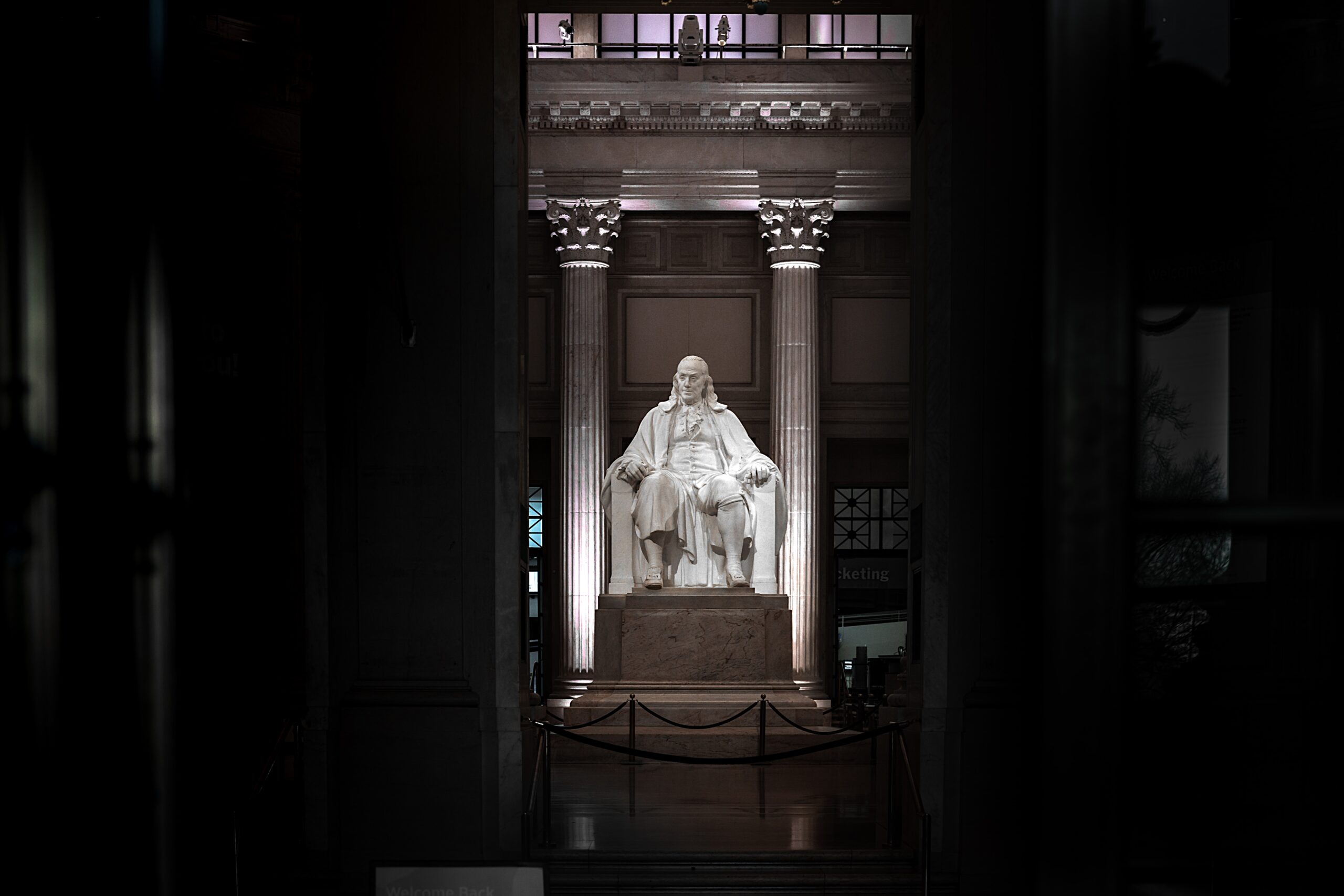I can’t say that I think of the Declaration of Independence much throughout the year, unless I’m listening to the Hamilton soundtrack. But as the Fourth of July draws near, I often recall the famous words that open the second paragraph:
We hold these truths to be self-evident, that all men are created equal. That they are endowed by their Creator with certain unalienable Rights, that among these are Life, Liberty, and the pursuit of Happiness.

I’ve always loved the phrase “the pursuit of Happiness” because of its wisdom and whimsy. The wording is wise because happiness cannot be guaranteed. It also seemed whimsical to me for the founding fathers to “dissolve the political bands,” “levy war,” and talk about happiness in the same context.
Then again, I didn’t really know what they meant by happiness.
The Modern Understanding of Happiness
So what does happiness actually mean? A global survey on the subject examines a series of indicators (GDP, life expectancy, social support, etc.) to determine a nation’s overall happiness levels; others rely on self-reporting. “Happiness” as a state of being seems to be a subjective, squishy thing.
Definitions are of limited help. Merriam-Webster refers to happiness as “a state of well-being and contentment,” and the Oxford English Dictionary adds “pleasure” to the mix. These explanations emphasize an individual’s internal emotional state without reference to others or to God. They certainly don’t give me any pointers on how to be happy.

Possibly the squishiest definition of happiness comes from Vocabulary.com (not necessarily the go-to site for Ultimate Truth, but I think it articulates the modern view):
Happiness is that feeling that comes over you when you know life is good and you can’t help but smile. It’s the opposite of sadness. Happiness is a sense of well-being, joy, or contentment. When people are successful, or safe, or lucky, they feel happiness.
Wow. If this is true, then failure, instability, and bad news guarantee that I will not feel happy. Ever. But at least I will have a lot of company. Millions of people definitely are not feeling “successful, or safe, or lucky” this year. Tomorrow’s Fourth of July will be unlike any other in American history (with the possible exception of July 1918, during the Spanish Flu pandemic). How does one attend a parade while maintaining social distancing? Patriotic concerts will be televised or posted to YouTube. Beaches are closed. Fireworks displays have been cancelled. Family gatherings will look different—grandparents may not feel safe to join the crowd.
This circumstance-based understanding of happiness might explain a lot about survey results from the World Happiness Report: Americans’ happiness levels have been trending downward for several years. The long-running General Social Survey, a public-opinion research project, indicates that from 1990 to the most recent survey in March 2019, the US showed a 50% increase in unhappy people. (Given the ongoing pandemic, I can only imagine how bad the numbers look for 2020.)
How can any of us pursue happiness in these circumstances?
The Founding Fathers and the Holy Fathers
The individualistic, emotion-driven idea of happiness is not something that the Founding Fathers of the US had in mind when they wrote the Declaration. In fact, their understanding of happiness was actually very Orthodox in many ways.

According to author Carli Conklin in The Pursuit of Happiness in the Founding Era: An Intellectual History, happiness in the 18th century meant “man’s ability to know the law of nature and … to choose to pursue a life of virtue or, in other words, a life lived in harmony with those natural law principles.”
Justin Dyer, writing in Public Discourse, explained,
The shared background assumptions that made sense of the inalienable right to the “pursuit of happiness” in the Founding era included a belief that God created the universe and the natural laws that direct the universe to its ultimate end or perfection. These laws include the physical laws that govern the inanimate and non-rational parts of creation, but also the moral law of human nature. The latter clarifies what constitutes genuine human well-being and thereby helps man to pursue his own happiness, or flourishing, by living a life of virtue.
Be in general virtuous, and you will be happy.— Ben Franklin
That’s definitely not a message I’ve heard lately. Imagine companies selling beer with tantalizing images of virtuous living as a reward. (The ladies love virtue!)
Our greatest happiness does not depend on the condition of life in which chance has placed us, but is always the result of a good conscience, good health, occupation, and freedom in all just pursuits.
— Thomas Jefferson
Although American founders like Thomas Jefferson, John Adams, and Ben Franklin held heterodox religious beliefs, their view of a Creator God and of His design for humanity points to much older Christian ideas. Their theology was fragmented, yet they retained a remarkably Orthodox understanding that living life according to God’s ways leads to fulfillment. They would have agreed with one of the Optina elders:
A life lived in humility and with an irreproachable conscience brings peace, tranquility, and true happiness. But wealth, honor, glory and exalted position often serve as the cause of a multitude of sins, and such happiness is not one on which to rely. — St. Makary of Optina
Of course, the founders spoke of God in a distant, impersonal way. I have little confidence in my ability to grow in virtue on my own, apart from prayer and the sacraments of the Church. For the Orthodox Christian, a life of virtue blossoms from our deification in Christ, dependent on God’s love for us and our response to Him.
If we want, Christian, to have our hearts filled with divine love we must first empty them of the love of this world, its frivolous and sinful customs and then turn our hearts to the one God, our only good and happiness and eternal beatitude. — St. Tikhon of Zadonsk, About True Christianity
It’s difficult to imagine a 21st-century American demanding the right to pursue a life of virtue. To be honest, I don’t think of my own happiness in these terms. When I’m feeling unhappy, my response is not, “If only I were more patient!” or “It’s time to give away more of my possessions!” Surrounded by shallow definitions of happiness, I have to consciously remind myself that the real thing does not depend on external circumstances and changing emotions.
The person who has deep faith within himself, and fixes his attention on the good path, and seeks to improve the condition of his soul and to adapt his thought to the good is happy.… The happiness of man consists in faith in God and in good acts which are done with love. — St. Raphael of Lesvos
That’s a great definition of virtue: “good acts which are done with love,” with the grace of God as foundational.
It’s a happiness that’s worth pursuing.
Good Morning ! I love all these adjectives of happiness: squshy, whimsical, and joy! It is so important for us all to remember, especially in these times, the joy of the Lord is our strength! I shall look up and thank God for his many blessings! He is my rock and my salvation! The Church Fathers remind us to do and be our best! Please share some of your fave spiritual books with your readers! As always, thank you for your research, love of God, and sharing with wit and wisdom!!
With Greek 🤗…
Just me, 🥰
Hi, Andrea. A list of favorite spiritual books a great idea. I’ll need to think about that and peruse my bookshelf. Thanks!
Enjoyed your “article.” Good insights.
Virtue restores our dignity in God as His highest creation.
What a blessing that is, and a great honour & privilege,
tho’ we often squander it so by not seeking Him with our
whole heart.
Thank you, Rhoda!
Thank you!